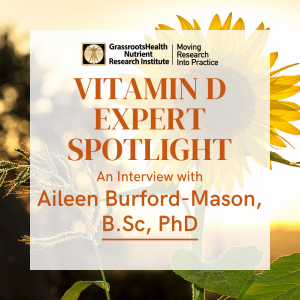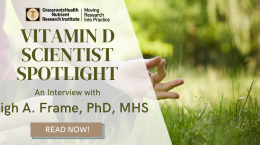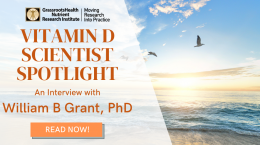Published on August 8, 2024
Learn more about our GrassrootsHealth Scientist and Expert Panel Members, their contributions to vitamin D research, and to moving that research into practice
Key Points
- Today, we are honored to interview Dr. Aileen Burford-Mason. Her key message: It’s not the amount of vitamin D you take that is important. It’s the amount you personally need to take to achieve target blood levels, and that amount can vary dramatically from person to person. There is no one-size-fits all dose of vitamin D that I can recommend.
- One of the most obvious signs of very low blood levels of vitamin D is musculoskeletal pain and weakness, which causes difficulty walking, climbing stairs, and can lead to a characteristic waddling walk; swaying from side to side when walking or walking as if feet hurt could indicate vitamin D deficiency. Many people are deficient without showing obvious physical signs and symptoms; she considers these people ‘accidents waiting to happen,’ as vitamin D is an integral part of so many critical metabolic functions, and low vitamin D has been shown to increase the risk of many disorders, including depression, inflammatory bowel disease, poor immune function, and generalized fatigue.
- Two key issues Dr. Burford-Mason points out about vitamin D research is that everyone must remember that vitamin D does not work alone but interacts and is interdependent on a panoply of other nutrients – magnesium, calcium, vitamin A and vitamin K; also, randomized controlled trials – considered the gold standard by mainstream medicine – are inappropriate for testing vitamin D as they were never designed to test such complexity

GrassrootsHealth is honored to have a panel of senior vitamin D scientists, researchers, and experts who have either contributed to the research itself or who have played key roles in moving that research into practice through education, advocacy, and implementation. Many have also endorsed our Call to Vitamin D*action, which serves as a consensus among top vitamin D researchers that the key to vitamin D for health is not measured by intake but by achieved serum level – specifically – achieving and maintaining a 25(OH)D level between 40-60 ng/ml (100-150 nmol/L) (or higher, depending on an individual’s specific conditions and the researcher’s expert opinion).
There are many messages about how vitamin D is essential for our health that fail to properly address how an individual should approach vitamin D dosing for themselves, especially since research shows that one dose does not fit all (a key message from today’s featured expert). There is also confusion about what target vitamin D level is optimal. Our Call to D*action is a clear and concise message, from the vitamin D experts themselves, to share with those who hear about the benefits of vitamin D but who are often confused or not informed about what to do with that information for their own health.
Today, as we continue hosting interviews of the scientists responsible for conducting vitamin D research and the experts responsible for moving the research into practice, we welcome Dr. Aileen Burford-Mason, B.Sc, PhD! Dr. Burford-Mason, a biochemist, immunologist and cell biologist, is an internationally-recognized authority on the use of nutritional supplements in clinical practice, including the optimization of Vitamin D. Her expertise in the field of nutrition and the role that appropriately-dosed vitamins play in the prevention and treatment of disease has been enthusiastically embraced by many doctors and the general public. Addressing such timely issues as immune function, healthy aging, and brain health, her courses and books are clearly written and accessible to scientists and non-scientists alike. She teaches popular courses for MDs and other practitioners on the use of diet and nutritional supplements in clinical practice.
She will be speaking in the upcoming Vitamin D Symposium in Canada on the topic “To Test or Not to Test: Current Controversies and Recommendations on Vitamin D Testing.” Learn more about the event here.
Interviews with the Experts: Aileen Burford-Mason, B.Sc, PhD
 Introduce yourself (name, degrees, current position, affiliations, etc.)
Introduce yourself (name, degrees, current position, affiliations, etc.)
Aileen Burford-Mason, B.Sc, PhD
Former Assistant Professor, Department of Pathology, Faculty of Medicine, University of Toronto
Director of The Conacher Head and Neck Cancer Research Laboratory, Toronto General Hospital
Orthomolecular Nutritionist and Independent Research Analyst, Healthcare Writer and Lecturer
https://aileenburfordmason.ca
If you have social media accounts that you would like for us to connect with and share, please list them here:
Research Gate: https://www.researchgate.net/profile/Aileen-Burford-Mason
LinkedIn: https://www.linkedin.com/in/aileen-burford-mason-bb056311/
X (Twitter): https://x.com/AburfordMason
Podcast: https://open.spotify.com/show/4Syp2liroIxkA3HsPazb0T
How much vitamin D do you take, and how long have you been taking that amount of vitamin D?
Initially I routinely took 3000 I.U. of vitamin D a day. Then I had my blood tested for the first time only to discover I was still in the ‘insufficient’ range. So gradually I started increasing my intake until I achieved blood levels towards the top of the reference range (180-200 nmol/L in Canada, or 70-80 ng/ml using US units).
And that is a key message I want to share: It’s not the amount of vitamin D you take that is important. It’s the amount you personally need to take to achieve target blood levels, and that amount can vary dramatically from person to person. There is no one-size-fits all dose of vitamin D that I can recommend.
Those who live in southern states of the US or nearer to the equator may not need supplements, provided they get sufficient sun exposure. Unfortunately, today even in sunny climates people may not get enough vitamin D if they avoid the sun. Of course, too much exposure to UV radiation can be harmful. But so can too little.
ABOUT YOUR EXPERTISE
 How long have you been involved in vitamin D research, education, and/or advocacy?
How long have you been involved in vitamin D research, education, and/or advocacy?
I have been interested in vitamin D and its impact on immunity and human health in general since the early 2000’s.
How did you get involved with vitamin D/What motivated you to start researching vitamin D?
My interest in vitamin D really peaked when we began measuring blood levels of vitamin D in about 2005, and I realized how widespread vitamin D deficiency was among Canadians. Because vitamin D is so intimately involved in musculoskeletal health, one of the most obvious signs of very low blood levels of vitamin D is musculoskeletal pain and weakness, which causes difficulty walking, climbing stairs, etc. It can also lead to a characteristic waddling walk. If I suspected someone was vitamin D deficient, I would ask them to walk up and down the corridor outside my office. If they swayed from side to side as they walked, or walked as if their feet hurt, I could usually guess correctly that their blood test for vitamin D would come back flagged deficient.
However, many people are deficient without showing obvious physical signs and symptoms and I consider these people ‘accidents waiting to happen’. This is because vitamin D is an integral part of so many critical metabolic functions, and low vitamin D has been shown to increase the risk of many disorders, including depression, inflammatory bowel disease, poor immune function, and generalized fatigue.
YOUR MESSAGE TO THE PUBLIC ABOUT VITAMIN D
What is the key message you want to get out about vitamin D 1) to individuals, 2) to practitioners, and 3) to public health authorities?
My message to the general public is that you need to work with a knowledgeable healthcare practitioner who will test your blood and advise you on how much vitamin D to take. They should also be able to advise you on key nutrients that need to be taken with vitamin D, such as magnesium and vitamin K.
For practitioners I would say start patients on the upper tolerable limit – that is, the amount assumed to be safe for anyone over the age of nine – which is 4000 IU. Then test for vitamin D three months later. It’s possible that 4000 IU is fine for some adults, but if not, you can increase the dose at this point.
What areas of research were you involved in before you started with vitamin D/what was your professional focus before vitamin D?
For the last 25 years I have worked in the field of Orthomolecular Nutrition. This is an approach to health and healing that focuses on providing sufficient vitamins, minerals, amino acids, and other essential nutrients to prevent and treat disease. Prior to that I did research in the immunology of the gastrointestinal tract, and later transitioned into cancer research.
GENERAL THOUGHTS ON VITAMIN D RESEARCH
Is there a particular area about vitamin D that you feel currently needs more exploration or research?
The bulk of research that has been done on vitamin D in recent years, especially during and after the pandemic, is bad research and needs to be classified as such. Many of the clinical trials done during COVID were shoddily designed and executed by clinicians with little basic knowledge of nutrition. As such they proved nothing.
In addition, we are forgetting that vitamin D does not work alone but interacts and is interdependent on a panoply of other nutrients – magnesium, calcium, vitamin A and vitamin K. Randomized controlled trials – considered the gold standard by mainstream medicine – are inappropriate for testing vitamin D as they were never designed to test such complexity.
Before we can move forward, we need more discussion around appropriate methods of researching vitamin D. I would like to see more of the vitamin D research community focus on defining what methodologies should be used to study vitamin D and its impact on health.
Thank you, Dr. Burford-Mason, for sharing more about yourself and your research! We appreciate your contributions to our current knowledge of vitamin D.
View Dr. Burford-Mason’s Expert Page here
Vitamin D is an Easily Modifiable Factor to Help Improve Disease Outcomes – Are You Getting Enough?
 Having and maintaining healthy vitamin D levels and other nutrient levels can help improve your health now and for your future. Choose which additional nutrients to measure, such as your omega-3s and essential minerals including magnesium and zinc, by creating your custom home test kit today. Take steps to improve the status of each of these measurements to benefit your overall health. You can also track your own intakes, symptoms and results to see what works best for YOU.
Having and maintaining healthy vitamin D levels and other nutrient levels can help improve your health now and for your future. Choose which additional nutrients to measure, such as your omega-3s and essential minerals including magnesium and zinc, by creating your custom home test kit today. Take steps to improve the status of each of these measurements to benefit your overall health. You can also track your own intakes, symptoms and results to see what works best for YOU.
Enroll and test your levels today, learn what steps to take to improve your status of vitamin D (see below) and other nutrients and blood markers, and take action! By enrolling in the GrassrootsHealth projects, you are not only contributing valuable information to everyone, you are also gaining knowledge about how you could improve your own health through measuring and tracking your nutrient status, and educating yourself on how to improve it.





